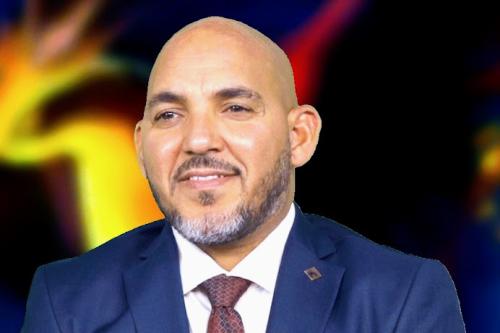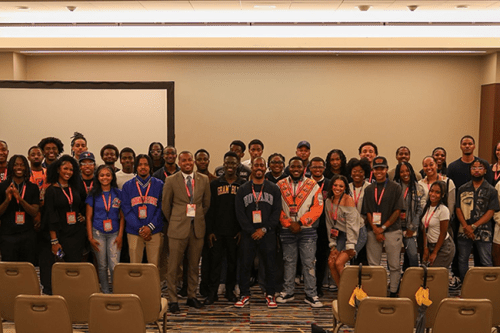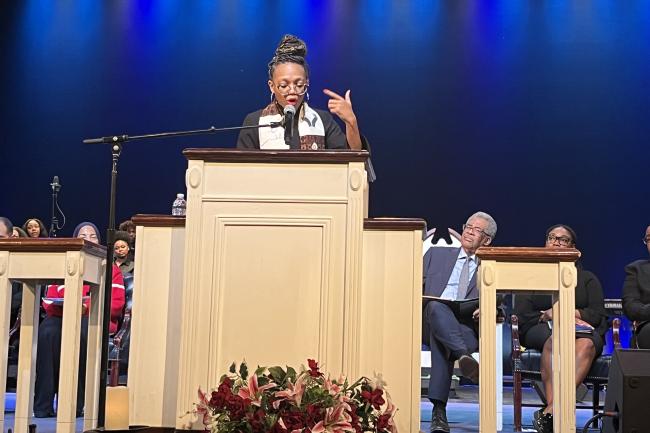Watch "A Call to Chapel" featuring Rev. Mahogany S. Thomas.
Reverend Mahogany S. Thomas, Womanist Theologian in Residence at Calvary Baptist Church in Washington, D.C. and chief program officer for Bread for the City urged those gathered at the February 2 edition of Andrew Rankin Memorial Chapel’s Sunday Service Series to remember that, no matter what is happening around them, they are inherently good because God made them so.
Reverend Thomas began by reading a passage from Jeremiah 18.
The word which came to Jeremiah from the Lord, saying: “Arise and go down to the potter’s house, and there I will cause you to hear My words.” Then I went down to the potter’s house, and there he was, making something at the wheel. And the vessel that he made of clay was marred in the hand of the potter; so, he made it again into another vessel, as it seemed good to the potter to make.
Then the word of the Lord came to me, saying: “O house of Israel, can I not do with you as this potter?” says the Lord. “Look, as the clay is in the potter’s hand, so are you in My hand, O house of Israel! - Jeremiah 18: 1-6 NRSV
“I want you to remind yourself that you are good.”
“The last time I wrestled with this passage, I was personally in a desolate place,” said Reverend Thomas. “And when I think about the transitions that are happening right here in our world, I think we too find ourselves in a desolate place.”
Thomas continued with a prayer in which she asked God to remind all of us that, in this time of division and change, “You have indeed made us good.”
She went on to describe her first job as a barista. Noting that while the nature of the job required her to perform many tasks in tandem, often with a line forming, she learned quickly that, “if I perfected the thing that I was making with my hands, regardless of how long you waited for it, when you took your first sip, you’d declared it was good.”
“The conditions may not always be ideal, but it doesn’t stop someone from declaring, what is good,” she said.
The text, she explained, “meets us in a place where we are wrestling with the good.” When God told Jeremiah to visit the potter, his relationship with God was one the Reverend called messy and complicated — wrestling with feelings of being abandoned and out of control, feelings that may be familiar to others in today’s hyper-charged political climate. “I too am wrestling with 'Where is the good?'” she said, going on to wonder how there can be good when “rescue missions become recovery missions” and “ICE is raiding our sacred spaces.” “Where is the good today?” she asked.
According to Thomas, answers can be found in Jeremiah 18. Upon arriving at the potter’s home, Jeremiah finds that just as the clay begins to take shape, it becomes marred and spoiled—only for the potter to then remake the clay vessel and declare it good. Jeremiah asks God if he too will be restored like the vessel. God answers Jeremiah with, “can I not do with you as this potter,” seeming to invite the prophet to see what He sees, which, according to Thomas is that even when a terrible situation leaves us feeling discarded and broken, like the clay, God can refashion us into something that is “good.”
But, how can bad things even happen when God is present?
“The vessel was spoiled in the potter’s hand, but if God is God, how can God spoil the clay?” asked Thomas. “If God is God, how can something spoil in his hands? How can God ever mess up the clay?” She continued, “I’m not sure if my theology allows me to worship a God who would ruin me to shape me. Who hurts me to raise me, intentionally spoil me to recreate me, that does not make sense to me.”
However, Thomas posits that it’s not the clay itself that is inherently prone to spoilage or ruin—nor is it God allowing it to happen—perhaps it’s the conditions in which the clay is being shaped which cause it to need to be remade. If this is the case, the Reverend declared the many negative occurrences happening today, occurrences like climate change, police brutality, Christian nationalism, and greed for example, as mere conditions that are no match for a God who can remake a person in the presence of any negative situation because He has already declared them to be inherently “good.”
“I could go on and on about the obstructions that are conditions, but Howard, there has to be some good news here. And I stopped by today to remind the clay in this room that you are good and that our goodness is not defined by the destruction that is caused by the conditions because in your blackness you are good,” she said. “Which means in your queerness, you are good. Which means in your body, you are good. In your insecurities, you are good. Which means in your broken heartedness, you are good. It means in your depression, you are good. It means in your grief, you are good. It means in your disabilities you are good. It means you are good. Because God made you good.”
Perhaps then, just like the carefully crafted cups of coffee Thomas made at her first job among all the chaos of a busy shop, God has meticulously crafted us all by hand and therefore no matter the environment we may find ourselves in; no matter the conditions that might try to destroy us, we are good.
“You can’t separate us from the love of God, which is good,” declared Reverend Thomas. “May you remember that you are good.”
Keep Reading
-

-
 News
NewsFICO Invests in the Howard University and PNC Center for Entrepreneurship
Jan 28, 2026 3 minutes -
 Uplift
UpliftService, Scholarship, and the Dream in Action: Howard University Inspires the Next Generation on MLK Day
Jan 23, 2026 2 minutes
Find More Stories Like This
Are You a Member of the Media?
Our public relations team can connect you with faculty experts and answer questions about Howard University news and events.
Submit a Media Inquiry

